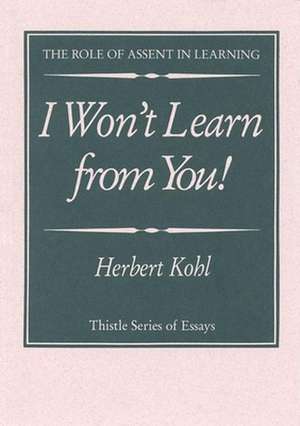I Won't Learn from You!: The Role of Assent in Learning: Thistle Series
Autor Herbert Kohlen Limba Engleză Paperback – 24 ian 1993
Preț: 36.30 lei
Nou
Puncte Express: 54
Preț estimativ în valută:
6.95€ • 7.27$ • 5.75£
6.95€ • 7.27$ • 5.75£
Carte indisponibilă temporar
Doresc să fiu notificat când acest titlu va fi disponibil:
Se trimite...
Preluare comenzi: 021 569.72.76
Specificații
ISBN-13: 9780915943647
ISBN-10: 0915943646
Pagini: 47
Dimensiuni: 127 x 177 x 6 mm
Greutate: 0.07 kg
Editura: Milkweed Editions
Colecția Milkweed Editions
Seria Thistle Series
ISBN-10: 0915943646
Pagini: 47
Dimensiuni: 127 x 177 x 6 mm
Greutate: 0.07 kg
Editura: Milkweed Editions
Colecția Milkweed Editions
Seria Thistle Series
Textul de pe ultima copertă
"I won't learn from you" is Herb Kohl's now-classic essay about the phenomenon of "not-learning", or refusing to learn, which takes place when a student's intelligence, dignity, or integrity is compromised by a teacher, an institution, or a larger social mindset. Available in book form for the first time, "I Won't Learn from You" serves here as a starting point for four new, groundbreaking essays by one of the country's leading thinkers on education. "The Tattooed Man: Confessions of a Hopemonger" is about the importance of teaching hope, and is Kohl's first autobiographical effort to discover in his own ghettoized childhood attitudes that let him recognize "not-learning" when he saw it among his students decades later. "Creative Maladjustment and the Struggle for Public Education" is inspired by Martin Luther King, Jr.'s call for creative maladjustment to an unjust society, and deals with the ways in which one can lead a positive life and learn new ways of maintaining opposition and resistance. "Excellence, Equality, and Equity" explores the relationship between these three crucial - and often confused - concepts. "Uncommon Differences" is about the way in which notions such as political correctness have been used to distract us from the central concerns of public education, including educating the poor, developing cultural diversity within the schools, and undoing the stigmatization of students who do not conform. It is about what public education in America can become. Written in Kohl's hallmark conversational style and employing the case examples that make his writing so compelling, these essays are at the forefront of current thinking on urban education.
